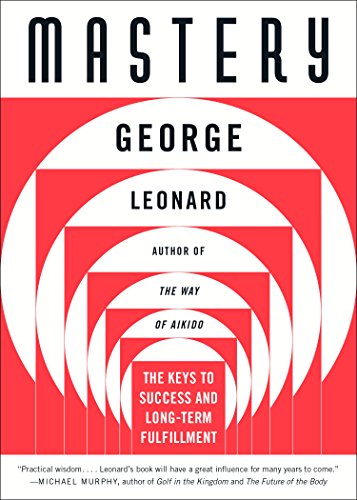
.
The Five Master Keys
The human individual is equipped to learn and go on learning prodigiously from birth to death, and this is precisely what sets him or her apart from all other known forms of life (p. 53).
Man is a learning animal, and the essence of the species is encoded in that simple term (p. 53).
… we face the task of learning skills for which there’s no cooperative surrounding environment, skills for which we aren’t as genetically predisposed to develop (p. 54).
More and more as we emerge into the teen and adult years, we must find our own doors to mastery. Chapters Five through Nine present five keys to opening those doors (p. 54).
Key 1: Instructions
… if you intend to take the journey of mastery, the best thing you can do is to arrange for first-rate instruction (p. 55).
The self-taught person is a chancy path. There are advantages: you enjoy the license of not knowing what can’t be done; you might wander into fertile territory previously ruled out by mainline explorers….. Most, however, have spent their lives reinventing the wheel, then refusing to concede that it’s out of round (p. 55).
Even those who will some day overthrow conventional ways of thinking or doing need to know what it is they are overthrowing (p. 55).
The search for good instructions starts with a look at credentials and lineage. Who was your teacher’s teacher? Who was that teacher’s teacher? (p. 56).
To see the teacher clearly, look at the students. They are his work of art (p. 57).
… the tape has no way of observing your swing and telling you how well you’re replicating the ideal (p. 68).
A book is also self-paced, and it’s portable and handy. Like tape, it suffers from lack of feedback capability (p. 69).
Commentary:
WARNING
This blog post contains commentaries that have been written in the style of a personal journal not as a way to brag…
But solely as a real example of how to process information from great books, so that they become deeply ingrained within our long-term memory:
The Instruction Principle is the reason why I read so much...
The importance of not trying to reinvent the wheel, but to rather make full use of what others have done and thought before.
Nonetheless, this book has also allowed me to better appreciate that being taught by a master may be far more superior (time efficient) than having to learn from a text, because there is a feedback loop (immediate assessment of what we are doing right or wrong, and how we may adjust and improve quickly).
Working on developing the Involgize intelligence program has also taught me the same thing….
There’s a big difference between the people that I teach one-to-one, in comparison, to those who are reading the same books, but lack my in-person contact and communication.
This part of the book, has also revealed to me that what I have chosen to do in life (mastering my numerous intelligences simultaneously) has presented me, generally, with no established masters to follow. Yet, it also reminded me that it will become increasingly important to seek teachers in regard to certain subjects or aspects of my development.…
In terms of the effectiveness of a master’s teachings being shown in the changing conduct and abilities of their students.
This reminded me that others will, only, see how effective the Involgize project is by the extent of the changing behaviour of those we assist... because ‘…the students will be a reflection of the teacher’s teachings.’
Key 2: Practice
… not as something you do, but as something you have, something you are (p. 74).
Practice is the path upon which you travel, just that (p. 74).
A practice (as a noun) can be anything you practice on a regular basis as an integral part of your life – not in order to gain something else, but for its own sake (p. 74).
In a nation obsessed with the achievement of goals, devotion to the goalless journey might seem incomprehensible if not bizarre (p. 75).
… the master goes along with rhetoric about scoring and winning, but secretly cherishes… games… regardless of who wins (p.75).
There’s another secret:… The truth is they love to practice – and because of this they do better (p. 75).
The master…. is the one who stays on the mat five minutes longer every day than anybody else (p. 76).
The master of any game is generally a master of practice (p. 77).
What is mastery? At the heart of it, mastery is practice. Mastery is staying on the path (p.80).
Commentary:
The Practice Principle is the reason why I treat consuming information as something more than what I do… rather… it is who I am!
My life is centred around my ability and time to consume information.
It is a goalless activity in the respect that it is never-ending – life long pursuit. There is always so much for me to learn, and it requires a person to be consistent and relentless day after day, week after week, year after year.
The truth also is that I love to read, learn, and develop my intelligences, as it is the time when I feel that my mind and energy is being put to the greatest use… making me feel truly alive, and empowered (without boundary or limitations).
This book allows me to appreciate that, overtime, I have become a master reader because I have spent more hours than most pursuing mastery every single day. And as long as I continue to do so then I am likely to continue growing in mastery ‘…to learn from birth to death.’
Key 3: Surrender
The courage of a master is measured by his or her willingness to surrender… to your teacher and to the demands of your discipline (p. 81).
It also means surrendering your own hard-won proficiency from time to time in order to reach a higher or different level of proficiency (p. 81).
It’s almost inevitable that you’ll feel clumsy, that you’ll take literal or figurative pratfalls. There is no way around it (p. 81).
… then there are the endless repetitions, the drudgery, the basic practice over and over again (p. 82).
Satisfaction lies in mindful repetition, the discovery of endless richness in subtle variations on familiar themes (p. 83).
Perhaps the best you can hope for on the master’s journey… is to cultivate the mind and heart of the beginning at every stage along the way (p. 88).
For the master, surrender means there are no experts. There are only learners (p. 88).
Commentary:
The Surrender Principle reminded me that I have always been willing to surrender to the demands of what it would be for me to continue mastering myself.
Meaning that I have been willing to stop reading, to learn how to write… to then stop writing to learn how to develop my numerical intelligence… to then stop focusing on my numeracy to practice law… and so on…. I have always been willing to do whatever it takes to pursue limitlessness. To put simply, a willingness to fall behind in the short-term so that in the long-term I would be able to go much further forward. And this process still continues.
I now better appreciate, more than ever, how important it is for many others to learn and apply this principle of surrender.
Moreover, to successfully use my process to inspire others to commit to becoming the best version of themselves… it will be extremely vital to, first, ensure that I am living up to the mastering-self principles every single day…
Before I have the audacity to attempt to teach others.
Key 4: Intentionality
It joins old words with new – character, willpower, attitude, imaging, the mental game… essential to take along on the master’s journey (p. 89).
The power of the mental game… (p. 89).
All other things being equal, the effectiveness of the technique depends on the vividness of the image (p. 93).
Thoughts, images, and feelings are indeed quite real. Einstein thought that energy is equal to mass times speed of light squared eventually unleashed awesome power. The transformation of the thought into heat and percussion was a long and arduous process…. the thought, the vision, the intentionality, was primary (p. 96).
… the first step is to create the vision, because when you see the vision there – beautiful vision – that creates the want power…. Intentionality fuels the master’s journey. Every master is a master of vision (p. 96).
Commentary:
Recently, I have been re-appreciating the primary importance of intentionality as the thing that kick starts everything else.
– Know Thyself
– Master Yourself
– Mastering-Self
– Involgize
In fact, this may be the first key that gives birth to everything else. If a person has the intention to live as a divine being then in time this will manifest itself. In other words, if a person set outs to master themselves in their lives then this will act as the very foundation where the development of other skills and abilities become truly possible.
Hence why I now see it as part of my existence to, truly, inspire others to pursue the journey of becoming the best version of themselves at all costs ‘master yourself’… ‘Involgize’… and so on.
To use the lower spheres (Sebek 8, Het-Heru 7, Auset 9) to achieve this objective by combining them with Heru 6, Herukhuti 5, and Maat 4.
Which means that I must ensure that everything that I touch, and listen too, see, and feel moves me in the direction of mastering-myself.
Within this principle also contains the importance of leadership. As true leaders generally are known for having a greater level of intentionality than the average person for sure. They have a vision of the future that allude others – as the bible says:… without vision the people perish.
Key 5: The Edge
… masters, are precisely the ones who are likely to challenge previous limits, to take risks for the sake of higher performance, and even to become obsessive at times in that pursuit (p. 97).
The trick… is not only to test the edges of the envelope, but also to walk the fine line between endless, goalless, practice and those alluring goals that appear along the way (p. 98).
Playing the edge is a balancing act. It demands the awareness to know when you’re pushing yourself beyond safe limits (p. 99).
We see this clearing in running…. Running fast and hard almost always demands playing the edge, and it can’t be denied that runners and would-be runners should be offered safe and sensible programs and warned against the dangers and pitfalls of their practice (p. 99).
But before you can even consider playing this edge, there must be many years of instruction, practice, surrender, and intentionality. And afterwards? More training, more time on the plateau; the never-ending path again (p. 101).
Commentary:
The importance of being methodical and systematic so that you know exactly where your edge is, and how to safely push it without unnecessarily push too hard and setting yourself back as a result.
Also the importance of being methodical and systematic so that you can keep your mind focused on the bigger lifelong picture, instead of getting caught up in the short to medium term so that you move towards becoming a true master.
Know that being systematic and methodical will affect every area of your life. So being-so in one area will make it easier to become likewise in others. Ultimately, this will make it easier for systematic and methodical people to achieve the highest levels of self-mastery.
